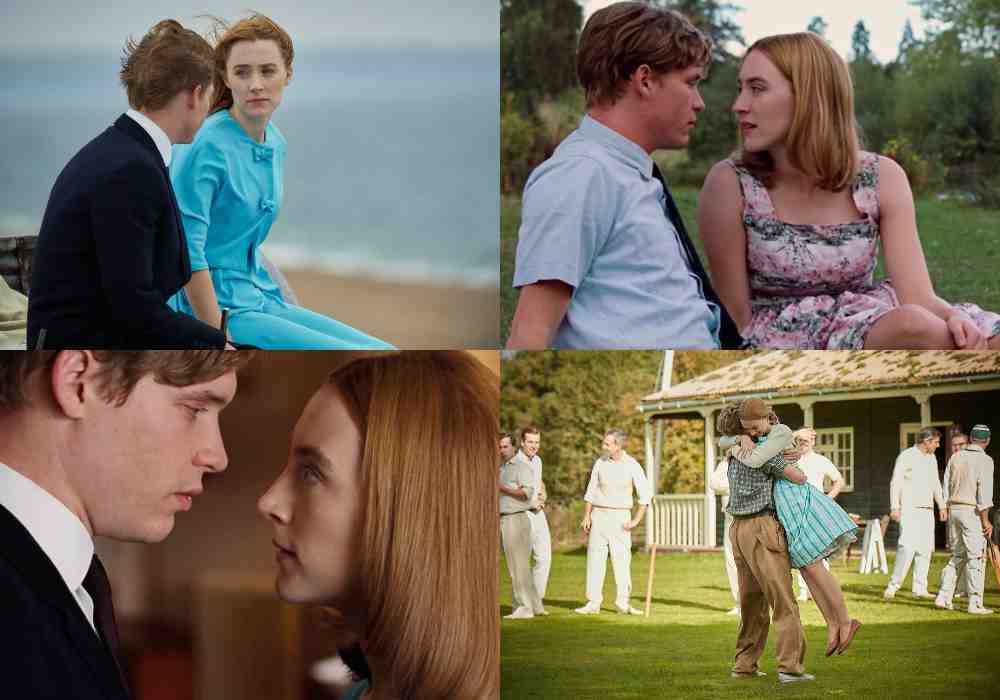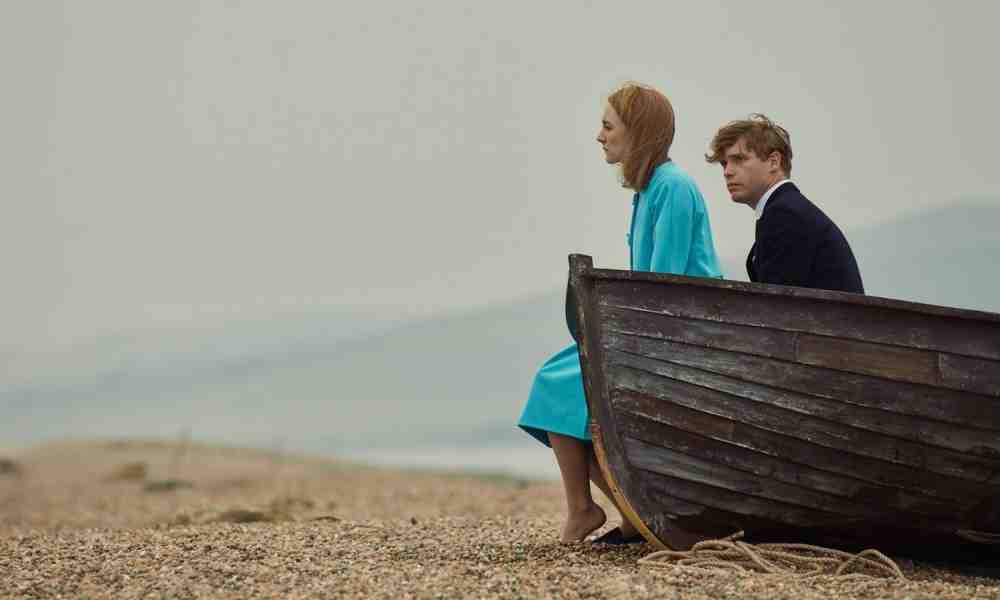On Chesil Beach editor Nick Fenton discusses his role and how, no matter the style or genre, everything he does stems from the actors. Read the rest of our On Chesil Beach Special Issue here.

On Chesil Beach is a feat of editing: through intricately placed flashbacks, we see a sweet romance unfold, juxtaposed with that same couple’s excruciatingly awkward wedding night. How do you balance those two tones without deflating either? How do you find a meaningful way to transition back and forth in time? Editor Nick Fenton delicately pieced these fragments together.
I spoke to Fenton about approaching that flashback structure, how his editing is guided completely by performance, and how his job as the “first audience” of the film allowed him to advise on reshoots, making the film’s cinematic language even more dynamic
Seventh Row (7R): What stood out to you when you first read the script for On Chesil Beach?
Nick Fenton (NF): The themes that the film and the book explore just came flying off the screenplay when I first read it. It was a time that I haven’t lived through, but I was very intrigued by it, because it was the time when my parents would have got married. They had very similar backgrounds, and these are issues that they would have had to grapple with. Despite the period we live in, it’s still a very important topic that isn’t really discussed. We all have to live through it at some point in our lives.
7R: Costume designer Keith Madden told us that he made his designs less period specific because he felt that the story has modern relevance.
Nick Fenton: In its cinematic language, as well, you don’t want the film to be out of place in time. People are very sophisticated in the way they tell, read, or watch stories nowadays. You don’t want it to be like you’re making a film in the ‘60s.
How we went back and forth between the time periods and how we dealt with memory was very important. There was a constant effort and desire to get it right so that the film itself feels modern in its language, but also to be very true to the period. Finding that balance was interesting. Music was very important in terms of time-posting what period we are in.
7R: On Chesil Beach opens with these traditional, picturesque shots of landscape. Then, more modern blues music kicks in. You’re immediately setting up this conflict between a traditional culture and the emerging cultural revolution that we see in the film.
Nick Fenton: Because Dominic comes from the cutting room — his father was an editor — he has a deep understanding of cinematic language and sound. His dad was a sound editor on one of my favourite films, John Schlesinger’s Billy Liar, a film made in the ‘60s. Dominic was very conscious of how the music was mixed and where it comes from.
That jazz number only comes out of the front speaker. It’s quite low in the mix. We were showing it for one of the first times at the London Film Festival. A studio logo played at the front of the film and it had a massive, bombastic surround sound orchestral theme that was overwhelming. And then the film starts in stereo, everything at the front, and it sounds like a shift back in time — to the extent where I was worried that the audience might feel that there’s a technical problem. We asked the studio to not have their bombastic orchestral sting at the front so that we could just ease people into the period. In the middle of the film, when we jump to the ‘70s and T. Rex comes on, we made the music louder and punchier to represent the time. It’s all of these little details that I hope make a difference for carrying the audience through different periods.
7R: At what point do you start working with the sound? The dinner table scene, with the sounds of the cutlery, wine being poured, people chewing… it’s very pronounced and makes it feel more tense.
Nick Fenton: Those sharp sounds of cutlery on plates, to bring out the delicate nature of the situation and the tension within the room, was all very intentional. It’s all there to heighten that sense of doing or saying the wrong thing.
The sound design team come in and start working in much more detail once the picture is locked. But they were able to come in and start doing very specific things quite early on. If we felt we needed that extra clarity, we would send the scene over to them. They would start laying in sound effects from quite an early stage just to enhance the storytelling. Technology allows us to do that rather easily.
7R: What things did you focus on in your initial discussions with Dominic?
Nick Fenton: Due to scheduling, the editor really only starts on the first day of the shoot. You’re very much responding to the material. You are that very important first audience. It’s about pointing out any issues, if you don’t think that something’s working.
It’s also about reassuring the team that they are getting everything. Dominic was blessed with [DP] Sean [Bobbitt], who is so experienced. They would meticulously work out how they were going to cover certain scenes. Sometimes, it’s quite worrying when they’re trying to do it all in one shot; you start getting a little bit concerned about not having much to play with.
[click_to_tweet tweet=”‘You are that very important first audience. It’s about pointing out any issues, if you don’t think that something’s working.'” quote=”‘You are that very important first audience. It’s about pointing out any issues, if you don’t think that something’s working.'”]
It was very much a discovery of the language, in this film, because we were fortunate enough to be able to go back and get a lot of detail, certainly in the hotel room in the climatic scenes — the fumbling, the moving. We went back in the hotel room, rebuilt the set, and we were able to pick up a lot of that.
7R: When you did those reshoots, you’d already started editing. Were they done because you felt it was lacking something?
Nick Fenton: I think I knew from the start that we didn’t have long enough to get everything in that hotel room. So we were very fortunate to be able to go back.
Those reshoots were mostly the closer shots that we jump into from the wider, more ‘tableau’ coverage from the original shoot. I think that really allowed me to adjust the rhythm editorially, to change pace, to up the excitement and the tension. When you’ve got those different sizes to play with, you’re able to do so much more.
We were working with different forms of memory, as well, which is always an interesting element to play with in the cutting room. It can be intrusive, or repressed memory — more dramatic; or it can be light and delicate and full of joy. This film has both.
7R: You really feel the closeups because they’re used quite sparingly.
Nick Fenton: The brilliant thing is there was so little waste — all these little extra moments that we got in reshoots, we used them all. It was very satisfying. We were very clear through our discussions about what was needed. There’s no doubt that the performances were there, but how do we enhance it just that little bit further and make it more cinematic? Those moments were crucial.
7R: Do you find there’s a difference working with theatre directors like Dominic and Benedict Andrews (Una) as opposed to directors who have only done film?
Nick Fenton: I do; they have a very different approach. They have this amazing enthusiasm for cinema. I think they relish it. They relish the difference enormously: they are making something that will last forever. And they have amazing abilities for working with actors.
7R: There’s a stereotype that theatre directors making quite stagey films. But both On Chesil Beach and Una really make use of the tools unique to cinema. Their editing is very immersive. There’s a real sense of the unresolved in Una, as we keep cutting away from conversations before they come to a satisfying conclusion. We feel frustrated in the same way the characters are frustrated that they can’t find closure. In On Chesil Beach, the harsh cuts when Florence is at home really makes us feel how tense and uncomfortable that family unit is. How do you think about the emotional effect your cutting has on the audience?
Nick Fenton: That is absolutely everything that you strive for: really feeling it from the character’s point of view. Having that strong emotional connection with what is going on, as opposed to an objective, observational connection. If that is coming across, that is fantastic.
It comes from responding to the performance in the rushes, which may vary from take to take. It’s about playing to the strength of that and making it work within the scene and within the context of the whole film. It starts off by bonding to the performance.
[click_to_tweet tweet=”‘That is everything that you strive for: really feeling it from the character’s point of view. Having that strong emotional connection, as opposed to an objective, observational connection.'” quote=”‘That is everything that you strive for: really feeling it from the character’s point of view. Having that strong emotional connection, as opposed to an objective, observational connection.'”]
7R: How much were you on set?
Nick Fenton: You’re not on set so much, but you’re in the cutting room [during the shoot]. Ideally, it’s great if you get the chance to be in the same room as the director and watch stuff, but more often than not, it might be a conversation every couple of days, just to go over what’s been coming in. Some people love to see assemblies. You cut them very, very quickly, so they’ll be rough, but it just means that they can move on in their head and be reassured that they got it.
7R: The flashbacks are very intricate. Was there a lot of experimentation with their placement in the film?
Nick Fenton: This was the strength of [the author of the source material] Ian McEwan having written the screenplay. He knows this raw material so intimately; he was able to create a screenplay with so little exposition.
We were very faithful to the script, for where and how these moments interrupt the present. The difficulty was just making them feel true to the language of the whole film, so that they have a progression and a story arc.
7R: When we spoke to Dominic, he said he was looking at the aesthetics of early ‘60s cinema. Were there any particular references that you looked at?
Nick Fenton: More to get a sense of the period than for any kind of cinematic style, I went back and had a look at films like A Taste of Honey (1961), Saturday Night and Sunday Morning (1960), Billy Liar (1963) — those Joseph Locey films, the guy who did The Go-Between (1971).
7R: Dominic also said that he had different rules for how to shoot each location. Did you have different rules for how you would edit scenes in those different environments?
Nick Fenton: The nature of the material you’re given dictates that to a certain degree. The sound in Edward’s family house was much more pastoral, based in nature; Florence’s family home was urban and had much harsher atmospheres behind it. It’s just about building on those choices so that it’s not overly obvious. It’s more of an invisible language that adds to the feeling that you’re trying to give off. It’s all about those emotions.
7R: Throughout the hotel scene, Florence is always looking out of the window as if it’s an escape for her. Did you have a different editing rhythm for when a character is outside, to reflect how being in that environment makes them feel?
Nick Fenton: When they’re out on the beach in the argument scene, we occasionally step out of the conversation when there’s a lull in the intensity. We take a breather. That’s when you realise the contradiction of, yes, being in a beautiful place, but also in a very lonely place for the two of them. It’s using the shot sizes and the rhythms to step out of the drama of the situation but also feel emotionally — through that angle, through that composition — how the characters might be feeling.

7R: I’d imagine the scenes that are just two characters at a table, talking, would be quite difficult to edit. How do you make them engaging?
Nick Fenton: That sense of performance, keeping that connection with the character, and tracking it throughout the scene. So making the choice about whether the reaction to what the other is saying is more important than watching the speaker. Very often, it’s the case that you don’t need to see the person who’s speaking. You want to feel the impact of the words.
You try all sorts of things. You just keep chipping away and changing it. As soon as you feel like you’ve got it working, you sleep on it, and come back and try it again. So it’s just reinventing the wheel as often as you can until you find something that comes alive beyond the words and the images.
[click_to_tweet tweet=”‘Very often, it’s the case that you don’t need to see the person who’s speaking. You want to feel the impact of the words.'” quote=”‘Very often, it’s the case that you don’t need to see the person who’s speaking. You want to feel the impact of the words.'”]
7R: Dominic said that he wanted to cut as little as possible. Was there a lot of debate with him on when you should cut and when you shouldn’t?
Nick Fenton: No more than normal. It’s always an issue. It’s a cliche that the editor’s always trying to find a straighter line through the scene. More often than not, you only need one line of dialogue instead of four. There’s an awful lot of trying things out in that respect.
It’s important to just be presenting different ways of seeing it, as well, so that you’re using the time that you’ve got. I think it’s really important to be constantly re-presenting the material to the director. Ultimately, you go down one path, and a third idea comes along that neither of you had thought of. Anything that allows you to be improving is time well spent.
7R: DP Sean Bobbitt said that he finds that “the conventions of cinema are actually rather dull and boring”. Is that an outlook you share? While the film is a period romance — a genre associated with a lot of cliches — this film felt unconventional both thematically and cinematically.
Nick Fenton: There’s a lot of stillness and quiet, which goes against the norms of cinema language. I think people get quite scared of being in a room where there’s not much happening. To force people to do that in the cinema is interesting. It’s also quite risky, because people want to be entertained. There’s an element of trust in the audience, as well — that they’re prepared to go with you on this journey. The film won’t be to everyone’s taste. If you worry about pleasing everyone, then you’re on dangerous territory. I think the original music that Dan Jones did is very subtle and interesting in that respect.
[click_to_tweet tweet=”‘I think people get quite scared of being in a room where there’s not much happening. To force people to do that in the cinema is interesting.'” quote=”‘I think people get quite scared of being in a room where there’s not much happening. To force people to do that in the cinema is interesting.'”]
7R: There are very memorable moments when you suddenly pull back into a wide. Every time we see the concert hall, it’s introduced in a striking, all-encompassing wide. And there’s a moment where we’re shown a tableau of the hotel room, with Florence and Edward stiffly arranged, almost doll-like, on the bed. How did you think about the purpose of these moments? You really feel them.
Nick Fenton: It’s exactly that. It’s about varying the cinematic language so that the framing has a meaning of its own that complements the psychology of the characters. If you feel you are in the moment with those characters with equal intensity, that’s the ultimate goal. Did you find you attached yourself with any particular character more than the other, or was that quite well balanced?
[click_to_tweet tweet=”‘It’s about varying the cinematic language so that the framing has a meaning of its own that complements the psychology of the characters.'” quote=”‘It’s about varying the cinematic language so that the framing has a meaning of its own that complements the psychology of the characters.'”]
7R: I think it’s quite an equal portrait of both of them. You really understand both.
Nick Fenton: That was really important. To be sympathetic to both of them whilst acknowledging the complexity of what they each are going through.
7R: I’d imagine that hotel room scene was quite complicated to cut, then. It’s so intricate: there’s a lot of complex blocking, and you have to take moments with both of them separately. Was there a long process of experimentation in the edit to get that right?
NF: Yes, definitely. It was crucial to be clear about who it was that you wanted to be with in any particular moment, before transitioning back to the other person.
Also, how we would enter flashback or memory and also how we would come back out. Whether there is a residue of the moment still lingering in the room or whether they’ve moved on to the next moment. It’s just about working out where the story is going next given what’s come before.
Hopefully, it varies, as well, so it’s doesn’t become predictable how we transition back and forth. That’s really important, because ultimately, if we used the same devices, if we used music or sound to transition in the same way each time, it would become very, very repetitive and predictable.
7R: How different is it working with a director like Richard Ayoade — particularly on The Double — compared to a more naturalistic approach with On Chesil Beach? Is your editing much more experimental?
Nick Fenton: They are very, very similar, ultimately, in that I try to centre myself around the main characters, regardless of how bizarre or surreal or strange the situation is. The key is retaining that point of view, and then all the other stylistic or rhythmic concerns fit in around that. From where I’m sat, something I’m always going back to with my decisions is that sense of performance and point of view.
Stylistically, Richard works quite differently: he has a crazy, encylopaedic head, in that he always knows how a sequence, however complex, might fit together. But he also relies on you being honest and giving opinions of what does and what doesn’t work in terms of emotional arcs.
Read the rest of our Special Issue on On Chesil Beach here >>
We’ve interviewed several other editors for our Special Issues, including Jonathan Alberts (45 Years, Lean on Pete) and Joe Bini (You Were Never Really Here). For our Best of 2017 round-up, we analysed the best editing of 2017. Documentary filmmakers have repeatedly told us about how crucial editing is to their process. We’ve compiled some of the best interviews with master documentarians in an eBook, Doc Masters: In Their Own Words Vol. 1, in which Frederick Wiseman, Gianfranco Rosi, Steve James, Penny Lane, and more discuss their differing approaches to editing.

